Donald Trump's early crisis
President Donald Trump begins his 11th day in office shrouded in crisis, roundly criticized for a chaotic unveiling of immigration measures and under new scrutiny after he fired the nation's top law enforcement officer who refused to enforce them.
On an extraordinary night of political drama Monday, the President dismissed acting attorney general Sally Yates by letter after she instructed the Justice Department not to defend Trump's immigration order, which bans travelers from seven Muslim-majority nations and temporarily halts refugee arrivals.
Yates was a remnant of the Obama administration, only in office until the Senate confirms Jeff Sessions as the next attorney general. But her dismissal reflected the sudden political forces unleashed in Washington in the early days of the Trump administration as the President seeks to impose his authority on the federal government and shows little patience for those who would block him from implementing core campaign pledges.
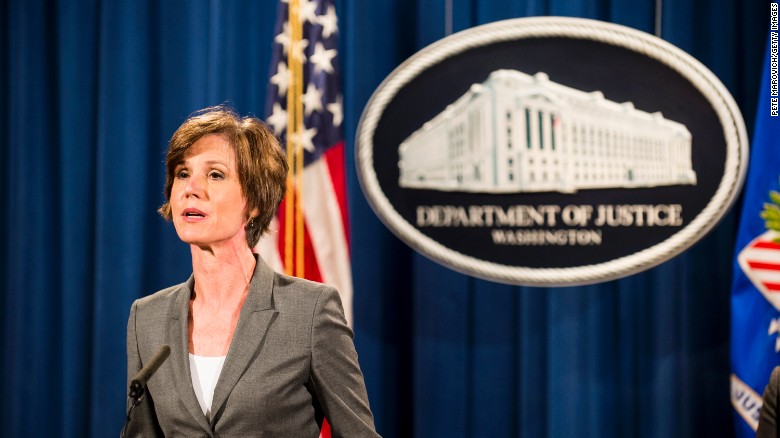
Yates in 2015: AG obligated to 'follow the law'
Democrats reacted with outrage to the night's dramatic events, warning that it called into question the independence of the Justice Department in the Trump administration.
"Trump has commenced a course of conduct that is Nixonian in its design and execution and threatens the long-vaunted independence of DOJ," Michigan Democratic Rep. John Conyers tweeted. "If dedicated gov officials deem his directives to be unlawful & unconstitutional, he will simply fire them as if gov is a reality show."
The dramatic move came soon after CNN reported Yates told Justice Department lawyers not to make legal arguments defending Trump's executive order on immigration and refugees.
"(Yates) has betrayed the Department of Justice," the White House statement said.
Read the full White House statement
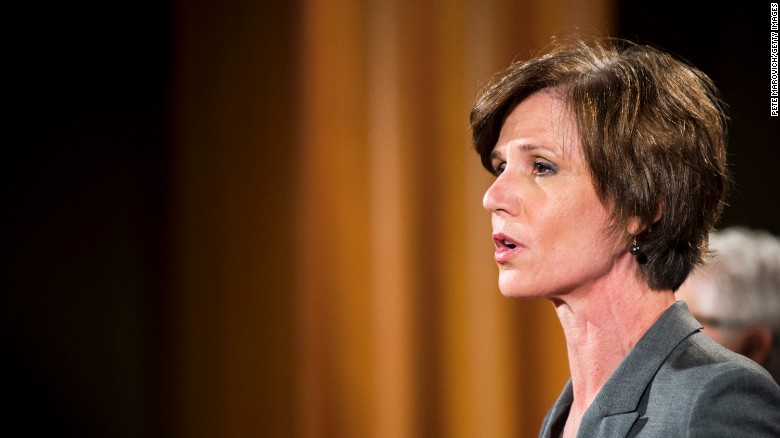
Deputy Attorney General Sally Yates was dismissed by President Donald Trump Monday evening
Dana Boente, who Trump appointed to succeed Yates as acting attorney general, rescinded Yates' guidance and instructed the Justice Department to "defend the lawful orders of our president."
Yates was fired as the administration was still recovering from the fury surrounding Trump's hardline immigration measures, including stinging criticism from some congressional Republicans who said the administration's process was far from smooth.
"They know it could've been done in a better way and my guess is they're going to try to clean it up," Senate Foreign Relations Committee Chairman Bob Corker, a Tennessee Republican, told reporters. "They probably learned that communication and the inter-agency process would probably be helpful."
But Trump's former GOP rival, Sen. Ted Cruz, jumped to the President's defense.
"After eight long years of a lawless Obama Department of Justice, it is fitting--and sad--that the very last act of the Obama DOJ is for the Acting AG to defy the newly elected President, refuse to enforce the law, and force the President to fire her," Cruz said in a statement.
Questions about White House functions
Trump's immigration order has triggered one of the more significant moral and constitutional controversies in recent memory. But on a more fundamental level, it is raising basic questions about how Trump's White House will function.
New acting attorney general set for brief tenure
On Monday evening, officials at the Department of Homeland Security were still spending hours in back-and-forth conversations with the White House. One source described receiving "cleared talking points" only to be called back minutes later to say they weren't right. The source said pages and pages of questions regarding interpretation of the travel bans were still being sent to the White House from the department.
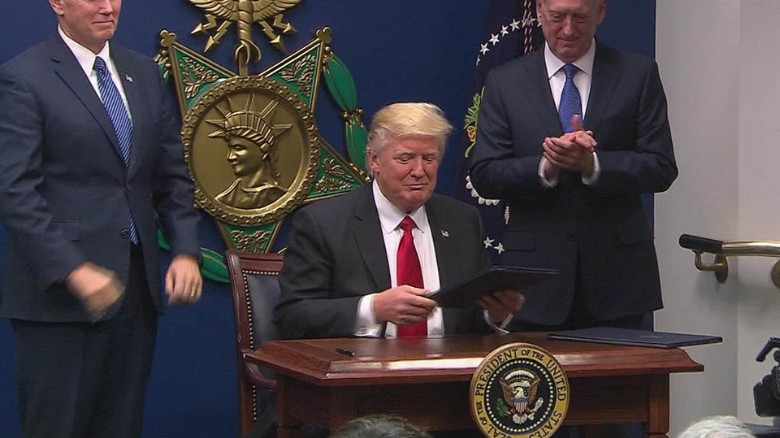
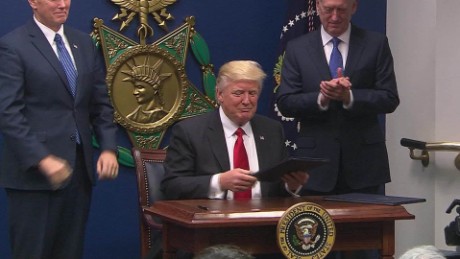
GOP on Defense after Trump's Actions 03:17
"These sort of amateur hour hijinks are costing President Trump precious political capital ahead of his aggressive legislative push," said Howard Schweitzer, a former high-ranking official in Republican and Democratic administrations. "The PR debacle and failure to circulate this plan with leaders in Congress or our allies was a costly error and overwhelms any of the legitimate policies behind his order."
Trump's rocky opening days come just as the administration needs to be at the top of its game ahead of Trump's announcement of his Supreme Court pick Tuesday night.
Tuesday's unveiling of a Supreme Court nominee will test whether he can win over crucial backing in Washington. In a polarized political atmosphere, a seamless introduction of a potential justice would strain even the most experienced West Wing, let alone a staff that has only been in place for less than two weeks and is already under fire.
If the administration clean up on the immigration order succeeds, there may be no lingering political price to be paid. But if the Supreme Court push staggers out of the gate, the Trump team could face an early political crisis on two fronts that will cast doubt on its capacity to enact its ambitious congressional agenda.
Monday night massacre is a wake-up call to Senate Democrats
Obama 'fundamentally disagrees' with Trump's immigration order
All new administrations have teething problems and it's not unusual for even experienced West Wing staffs to fumble badly. The disastrous debut of the Obamacare website in 2013 played into GOP claims that the law was botched by an incompetent administration.
And there is no doubt that Trump is doing exactly what voters who rewarded him with 306 electoral votes sent him to Washington to do.
There is a strong sense in many parts of the country that the US government has been too lax in its vetting of Muslim visitors to the US out of a sense of political correctness. And while chaos reigned at the weekend, Trump's penchant for stirring confusion with his improvisational management style has often served him well as a businessman and in his short, successful political career.
Presidential brand
Still, one of the president's central claims to the White House is that he, and only he, can cut through what he portrays as dire problems facing Americans. So any hint of incompetence could damage his presidential brand and undercut his claims that his business tycoon personality can get things done.
The administration's defense of its actions Monday followed a now familiar tactic -- attacking the media for its coverage and fogging the facts with an alternative narrative.
"I think this has been blown way out of proportion and exaggerated," said White House spokesman Sean Spicer on Monday. "I think frankly government functioned very well. That's the takeaway from this, that the system worked well, the country is safer for it."
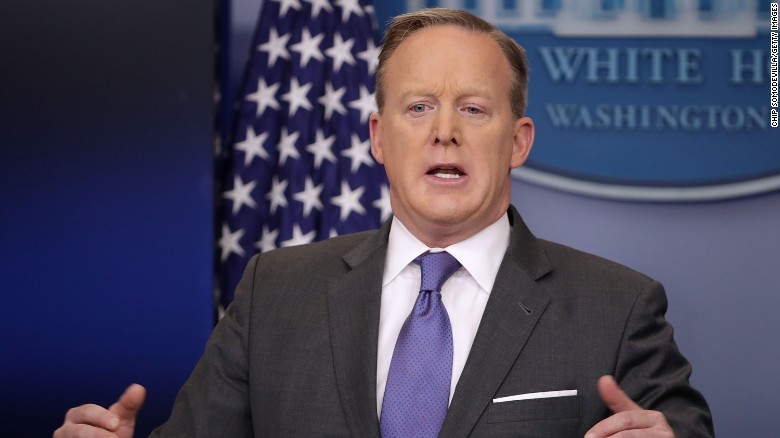
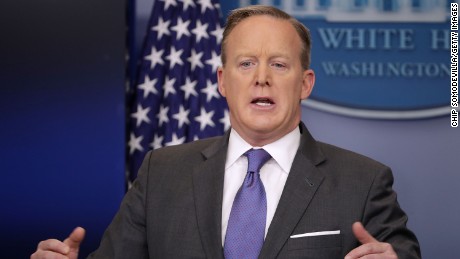
Entire White House remarks on immigration
The White House also made a case that the sudden change in policy was necessary to keep Americans safe from terrorism.
"We had 109 people that were temporarily detained. They were temporarily detained to make sure that the safety of the other 324 million Americans was put first. I don't see how that's a big problem," Spicer said.
Trump blames 'tears of Senator Schumer,' Delta computers for airport issues
Trump, meanwhile, said in a tweet that it would have been foolhardy to have announced his policy in advance, as it would tipped off terrorists.
"If the ban were announced with a one week notice, the "bad" would rush into our country during that week. A lot of bad 'dudes' out there!" Trump tweeted Monday.
Though advancing a hardball national security argument, Spicer appeared to indicate on Monday there was no specific intelligence suggesting an attack was imminent from nationals of any of the seven listed nations.
"I think what we're trying to say is you don't know when the next threat is coming," Spicer said.
Terrorism experts have pointed out, however, that none of the terror attacks on US soil since 9/11 emanated from any of the seven nations targeted by Trump.
Administrative confusion
The sense of administrative confusion in the government also undermines White House claims that everything went smoothly. Minutes before Trump signed the order in the Oval Office on Friday, his counsellor Kellyanne Conway told reporters that the immigration measure would not be issued that day. And in the hours after its release the White House struggled to explain exactly what it meant and which nations it would impact.
Meanwhile, it seems instructions for how to enforce the new rules did not reach the officials on the front line — at America's airports — sparking delays and confusion.
"At the operator level, there was confusion and that needed to be flushed out and perhaps still needs to be flushed out," said James Norton, a Deputy Assistant Secretary for Legislative Affairs Department of Homeland Security during the Bush administration.
America's borders are policed by a diverse collection of officials from Customs, Immigration and Citizenship agencies and not all were clear what the new rules entailed.
That may explain uncertainty over whether green card holders were affected.
What to know about Trump's visa and refugee restrictions
US allies were still puzzled Monday with the implications of the ruling. Britain said UK dual nationals would not be stopped from entering the US. Germany was not so sure.
There was also intense frustration on Capitol Hill, where GOP aides rejected the rationale that they were kept in the dark for national security reasons.
"If that's their approach going forward in terms of engaging the Hill on national security issues, then they're going to find out that the results are more than just a weekend of bad press," said one aide who asked not to speak for attribution.
Spicer denied that the White House had left its congressional allies and government agencies in the dark.
"Everybody was kept in the loop at the level necessary to make sure that we rolled it out properly," he said.
But Schweitzer, who has piloted the Senate confirmation process of 20 presidential nominees, warned that if the White House did not up its managerial game, it would be offering an opening to its opponents.
"Trump's executive order was poorly written and implemented, and has generated so much negative press that it's reinforcing the Left's image of the Trump White House as xenophobic, incompetent hardliners," he said.
News Courtesy: www.cnn.com












